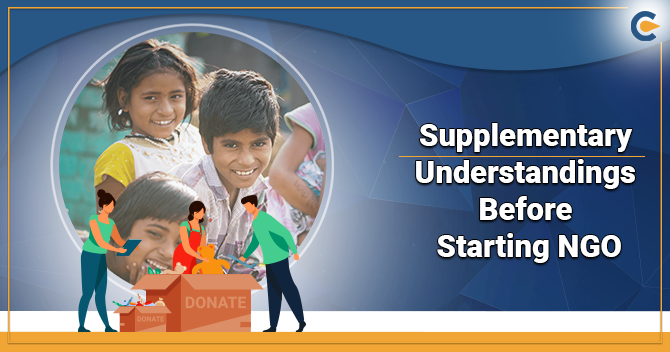NGO is a Non-Governmental Organization and may be defined as an association serving social justice and having a definite culture, social program, education, etc, registered with the Central Government. NGO is a non profit social and voluntary organisation of community of persons, volunteers and citizens.
Although, NGO is registered at the Government’s registering authorities but it is managed and operated by its members and associated persons who are obliged to work in accordance with the rules of the Government but independently from the government control aiming for the welfare of the society and communities as the Government do.
Therefore, it is important to know the advantages and disadvantages of NGO in India in order to carry on it functions in conformity with the Government rules.
Procedure to Follow While Registering an NGO in India
According to Indian laws, the function of a Non-Governmental Organisation can be either as a Trust, Society or Section 8 Company. The registration of NGO in India occurs in the following ways:-
It is important to know the procedure to start with NGO in India. The given below is the procedure to follow while starting an NGO:-
- Decide the Objective & Purpose of NGO
- Draft NGO’s Mission, Vision, and Objectives
- Decide Board of Directors to Lead NGO
- Include Like-Minded Volunteers for Team Work
- Draft Memorandum and Articles of Association
- Decide on Name and Register NGO
- Get Funds for NGO
- Grow Connections and Build a Wide Network
What are the Supplementary Requirements before Starting NGO?
NGO in India has the mission towards striving social justice, sustainable development and human rights. The right to freely communicate & have the requisite information and sustainable development is the basic rights of an individual.
Therefore, NGO acts as a bridge between the citizens and the government and provides the data gap and information to establish and develop an ideal medium for the exchange of accurate source of quality information. Few of the major but supplemental requirements before starting a NGO in India include:
Read our article:NGO Registration in India and Its Choices
Role of Social Activists in Development of Society
The development is only possible with the change in socio-economic conditions. These changes can be possible by participating in the welfare programs and activities. These social activists mainstream work is to solve the root cause of the evil or disturbance.
They work to implement result oriented socio-economic change by making policies that can affect the crowd at large especially the underprivileged and marginalised sector of the society. The social activists follow the principle of “Sarvajan hitay- sarvajan sukhay”.
Authentic Source Material and Information
NGO in India is a resource centre for required materials and information and other kinds of concerned knowledge based documents. NGO can get authentic information to achieve their aim and target.
NGO in India also provides direct support for NGO registration, management, to search and get funding and other financial projects with the consultants help. The online portal provides Government funding[1] schemes information and other databases that can guide the NGO as required.
Networking among NGOs & Activists to Implement Concepts and Plans
NGO in India is working by promoting and making resource and information by collaborations and creative & constructive networking among NGO to develop efficient partnership so as to work together and implement their objectives to develop and improve the socio-economic conditions.
Network of Volunteers and Supports
There are many such NGO which exists and works without any funds due to the availability of support persons and volunteers. NGO in India has supporting and recognised NGOs who are transparently working for a social change and are ready to contribute their resource and time by working for the various sectors of the society.
What are the Advantages of Registering NGO in India?
There are diverse numbers of advantages of registering NGO in India which are as follows:-


Separate Legal Identity
A registered society is a separate legal identity and each member of the society is accountable for their own actions and is not liable for other members.
Limited Liability
Because society NGO is a separate legal identity, hence the liability of the members is limited as per their share only.
Benefits on Income Tax
There are various tax benefits for NGO such as exemption from Income Tax, etc. and the benefit of 80G certificate under the Income Tax Act.
Legal Protection
Once it is registered as society under Society Registration Act or as an NGO nobody can use its name as it is given the legal protection so if there is an infringement then they will be penalty charged for the same.
Voice for a Cause
The advantage of NGOs in India is that it provides with one of the most essential voices for government aid schemes and agendas.
Educations of Children
NGOs have an important role in facilitating the education of children. Example: – giving free books and computers to the poor and rural schools. Many NGOs are into teaching under- privileged children.
Protection of Animals
NGO in India has many programs which aim to take adequate care in preventing animal cruelty and protecting & safeguarding animals.
Development and Operation of Infrastructure
NGOs in India can participate in acquiring and developing lands construct infrastructure and build housing. They are also into providing basic amenities like public toilets, wells, sanitation and waste collection services.
Empowerment of Women
Few NGOs in India have involved themselves in activities relating to upliftment of women.
Environment Protection
NGO has a major role in protecting the environment with their different projects on afforestation and prevention of water and air pollution, etc.
Disadvantages of NGO in India
Although NGO play a major role in development but few limitations of NGO that leads to its disadvantages are given below:-
Lack of Financial Resources
Lack of finance is something which is unavoidable while running a NGO. Because of the shortage of funds they have to depend on Public contributions or corporate sponsorship.
Lack of Trained Staff
Most of the volunteers of NGO in India is the untrained staffs and is not skilled in handling the problems faced by people. Because of this lack of accountability from the staff it hinders the growth of NGOs.
Mismanagement of Funds
Due to mismanagement of funds the general public has lost confidence on the NGOs as there were cases of misappropriation of the funds by NGOs.
Territorial Possessiveness
NGOs of different region or projects reduces the cooperation amongst them and often seen as a threatening competition in the market.
Conclusion
NGOs in India need strong support and relationship with the public to accomplish their goals. There are more advantages than the disadvantages of NGO as these organisations are the main reason behind improving the socio-economic condition of our country.
Thus, NGOs in India must be promoted for better sustainability and for uplifting the protection of human rights for long.
Read our article:An Outlook: Registering an NGO in India











